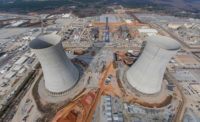Construction Risk Management
US Nuke Project Owners Prepare for Worst From Westinghouse
Will hundreds of millions of dollars in surety guarantees and letters of credit be needed?

One of the South Carolina nuclear projects under construction recently. Photo: SCANA public filing.
Despite the Feb. 14 resignation of Toshiba's chairman over a $6.3-billion loss on two U.S. nuclear-power contracts, subsidiary Westinghouse Electric Co. sought to assure its utility clients that it is committed to completing the projects. Both are significantly over budget and behind schedule.
Nevertheless, the electric utilities building the power plants, sited in Georgia and South Carolina, say they are reviewing contractual contingency plans, including hiring new contractors, making claims under surety bonds or tapping letters of credit to cover costs to complete the work.
The damage the two projects have inflicted on Toshiba is one of the biggest stories of the new year. Westinghouse took over as engineering-procurement-construction contractor for the projects more than a year ago, after Toshiba purchased the U.S. nuclear business of CB&I-Stone & Webster.
In late 2016, Toshiba revealed Westinghouse’s assessment of the value of assets and liabilities acquired from the December 2015 deal. It stated that the cost to complete the Georgia-sited Plant Vogtle and the South Carolina-sited V.C. Summer nuclear expansion projects “will far surpass the original estimates.”
Toshiba said the cause was due to “increases in key project parameters.” So far, neither Toshiba nor the owners have publicly noted any new claims by Toshiba for design errors or owner-initiated change orders.
On Feb. 16, South Carolina Gas & Electric (SCE&G) and corporate parent SCANA used much of the utility’s fourth-quarter earnings call to discuss current and potential future implications for its V.C. Summer nuclear expansion.
SCANA Chief Executive Kevin Marsh first noted Westinghouse’s assurances of commitment to completing the project in Jenkinsville, S.C., adding, “We still anticipate completing our two new nuclear units.” The utility also noted the contractor’s revised in-service dates for the two units, now April 2020 and December 2020, respectively. New nuclear plants must be operational by Dec. 31, 2020, to qualify for millions of dollars in federal subsidies via nuclear production tax credits.
Replacing Westinghouse Contemplated
The utility is not waiting to prepare for a possible change in contractors, though. Said Marsh, “We have already initiated steps as identified in our original EPC contract to assist in the orderly transition to a new construction team and assist in the continuation of construction activity, if necessary.”
As a result of Toshiba’s credit rating slipping in 2015 into a “speculative” grade, Westinghouse’s contract with SCE&G required it to “establish a surety bond in the form of standby letters of credit” of up to $100 million, according to the utility. Additionally, the South Carolina utility began a process of escrowing intellectual property and software for Westinghouse’s AP1000 design.
“Should it become necessary, having access to the AP1000 design and software and the ability to call on the letter of credit would assist with a transition to a new construction team,” Marsh adds. During the fourth quarter of 2016, SCANA executed a change order of $1.6 million for "compiling and escrowing the source code for certain software, design data and facility documentation that would be required for completing construction of V.C. Summer Units 2 and 3 independently of Westinghouse," according to spokeswoman Rhonda O'Banion. In early February 2017, SCE&G confirmed that Westinghouse had begun depositing certain intellectual property and software into escrow, she added.
Additionally, SCE&G noted that its amended EPC contract with Westinghouse requires the contractor to pay project owners liquidated damages of up to $676 million if construction goes beyond August 2019 and August 2020, the new units’ respective guaranteed substantial completion dates.
If Westinghouse leaves the project, the utility laid out three possible scenarios for continuing construction: SCANA-SCE&G takes over as general contractor, it enters into a new EPC contract, or it enters into a procurement and construction contract.
On both the Vogtle and V.C. Summer contracts, Westinghouse is serving as EPC contractor, with Fluor as general contractor.
Possessing $920 Million in Letters of Credit
Georgia Power, the majority stakeholder for the project ownership team at the $16-billion, two-reactor Vogtle expansion, is similarly reviewing possible contingencies.
“We continue to monitor the financial position of Toshiba, which is the guarantor for Westinghouse under our engineering, procurement and construction agreement,” Georgia Power spokesman Jacob Hawkins said in a statement. “Under this agreement, Westinghouse has taken the actions required in connection with Toshiba’s financial condition. The project owners currently possess $920 million in letters of credit consistent with the terms of that agreement.
“While we cannot speculate on what may happen in the future with Toshiba or Westinghouse and their overall business, we will always hold them, as the contractor, accountable for their responsibilities under our agreement,” the statement continued.
Responding to questions during its own Feb. 22 earnings call, Tom Fanning, chairman and CEO of Southern Company—parent of Georgia Power—downplayed the potential for Westinghouse leaving the Plant Vogtle project, but said the utility was ready to take over should that situation arise.
"I would argue that Southern Company, unlike anybody else in the United States, has the technical depth to be able to step in, if we need to, and finish the project," Fanning said. "Further we have all of the contractual rights with respect to getting IT to make sure we can run the project successfully. We’ve been through every one of those contingencies. I think those are way more tail risk than they are substantive, but if they ever become substantive we’re primed and ready to go."
Meanwhile, if the V.C. Summer project were to be abandoned, South Carolina’s Base Load Review Act holds the potential that some costs could not be passed along to utility customers. Asked about the possibility of abandoning the project, SCANA’s Marsh said, "That’s not something that's high on our list. We’d certainly like to finish these projects. They’re critical to us over the long term."
Moreover, Marsh adds: “Even though Mr. Trump has talked about changing some of the rules that might be in effect on clean-air regulation. I believe people will continue to be focused on clean air and as much carbon-free emission as we can, so we’re sticking with our strategy, and these plants are critical to doing that.”




